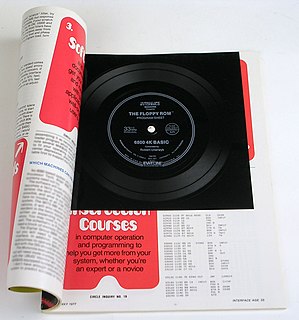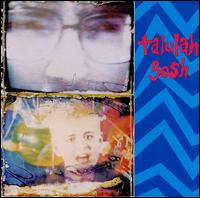Heavenly were a 1990s twee pop band, originally forming in Oxford, England in 1989. Amelia Fletcher (vocals/guitar), Mathew Fletcher, Peter Momtchiloff (guitar) and Robert Pursey (bass) had all been members of Talulah Gosh, a key member of the C86 scene.
Marine Research were an indiepop/twee pop band, based in Oxford/London (UK), formed in 1997 by four of the five members of Heavenly, following the suicide of Heavenly drummer Mathew Fletcher. The band were joined on drums by DJ Downfall, who is also a solo recording artist.
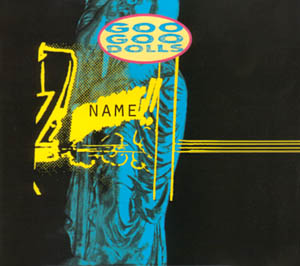
"Name" is an alternative rock song by the American rock band Goo Goo Dolls. It was released in September 1995 as the third single from the album A Boy Named Goo. As the band's first hit, the song topped both the US Modern Rock chart and the US Album Rock chart, and reached number 5 on the Billboard Hot 100.
The Pooh Sticks were an indie pop band from Swansea, Wales recording between 1988 and 1995. They were notable for their jangly melodiousness and lyrics gently mocking the indie scene of the time such as on "On Tape", "Indiepop Ain't Noise Pollution" and "I Know Someone Who Knows Someone Who Knows Alan McGee Quite Well". The band changed direction on their 1991 U.S breakthrough The Great White Wonder, eschewing the 'twee' British indie pop sound for a more American-styled power pop sound, akin to bands like Jellyfish and Redd Kross. Subsequent albums Million Seller, released on 11 January 1993, considered by some power pop fans to be the band's best work, and Optimistic Fool, released on 24 April 1995, followed in this style.
"Talk Tonight" is a song by English rock band Oasis, written and sung by the band's lead guitarist Noel Gallagher. It was released as a B-side on the UK #1 single "Some Might Say" along with "Acquiesce" and "Headshrinker" and appears on the B-side compilation album, The Masterplan, as well. In the United States, it was released as one of the B-sides to "Wonderwall". This song also appears in remastered form on the 2014 deluxe version of (What's the Story) Morning Glory?.
Amelia Fletcher, OBE is a British singer, songwriter, guitarist and economist.

The English pop rock band Tears for Fears have released six studio albums, along with numerous singles, compilations and videos. Formed in 1981 by Roland Orzabal and Curt Smith, the duo signed to Phonogram Records in the UK and released their first single the same year. It was not until Tears for Fears' third single, "Mad World" (1982), that they scored their first hit, and their platinum-selling debut album The Hurting (1983) was a UK number one.
Razorcuts were an indie pop band formed in 1984 in London. The group centred on Gregory Webster and Tim Vass, with various musicians including Peter Momtchiloff of Heavenly. Early releases on the Subway Organisation label, including the debut Big Pink Cake led to a deal with Creation Records for whom they released two albums. Razorcuts split up on 21 April 1990, with Vass going on to form Red Chair Fadeaway, and Webster to The Carousel and Saturn V. The duo were reunited under the name 'Forever People' in 1992 for a one-off single on Sarah Records.

Would-Be-Goods are a British indie pop band fronted by singer Jessica Griffin, noted for her precise received pronunciation accent when singing. Their name was inspired by the 1901 novel The Wouldbegoods, by children's author E. Nesbit.

We Love the City is the third album by British indie rock band Hefner. It was released by Too Pure in two formats in 2000, the standard version and a second version with a disc featuring videos for "I Took Her Love for Granted" and "Good Fruit," as well as a John Peel session. The entire John Peel session was later released as the album Maida Vale. The album was reissued in 2009.
Michael Graham 'Mickey' Jupp is an English musician and songwriter, mainly associated with the Southend music scene.

"Parallel Horizontal" is a song by the indie pop band Marine Research. It first appeared as a single on 27 July 1999 and then as the opening track on their only album Sounds from the Gulf Stream on 24 August.

History Never Repeats – The Best of Split Enz is a compilation of hits by New Zealand rock band Split Enz. Initially released in the US in 1987, then in NZ/Aus in 1989, the album has been through many variations and reissues over the years and probably stands as the band's best-selling compilation.
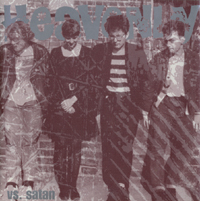
Heavenly vs. Satan is the first album by British twee pop band Heavenly. It was released by Sarah Records in January 1991, as SARAH 603. No producer is listed in the sleevenotes, although Richard Haines is credited with engineering.
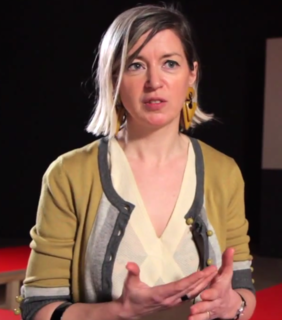
Elizabeth Price is a British artist who won the Turner Prize in 2012. She is a former member of indie pop bands Talulah Gosh and The Carousel.

Palmyra Delran is an American rock and roll musician, songwriter, guitarist and producer who was born in Princeton, New Jersey and later moved to Philadelphia. She played in seminal 1990s Philadelphia-area rock bands The Friggs and Pink Slip Daddy, as well as several of her own solo releases and recordings.

Back from the Grave, Volume 7 is the seventh installment in the Back from the Grave series of garage rock compilations assembled by Tim Warren of Crypt Records and is available on LP and CD. It was originally released in 1988 as a double-LP containing 34 tracks, and has been newly re-mastered and re-issued in 2015. Though most of the LP's tracks had appeared on volumes 3 and 4 of the Back from the Grave CD-specific sub-series, in 2015, it was released on CD with the re-mastered material and closely matches the song content of the original LP as part of an effort to bring the LP's and CD's of the series into multi-medium coherence. In keeping with all of the entries in the series, and as indicated in the subheading which reads "Raw Blastin' Mid 60s Punk," this collection generally excludes psychedelic, folk rock, and pop-influenced material in favor of basic primitive rock and roll, usually consisting of songs displaying the rawer and more aggressive side of the genre often characterized by the use of fuzztone-distorted guitars and rough vocals.




